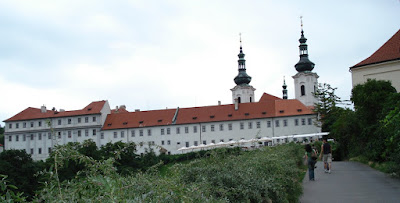I was in Prague a few years ago with two of my children, both in their early twenties at the time. We were researching accommodation for the Good Night and God Bless travel guides and one morning, found ourselves in the restaurant of a vast medieval monastery on the perimeter of the city. After a couple of hours exploring the monastery and the accommodation in the hotel owned by the monks, I was in need of a morning pick-me-up. We sat in the garden of the monastery restaurant, the Klášterní šenk where I ordered a large, strong cappuccino. The kids had a quick, whispered conversation before one of them piped up with ‘Mum, we’ll have a beer because beer is cheaper than coffee’. I was a little taken aback, but at least they had the grace to look sheepish. After 20 odd years, this sudden interest in saving me money was somewhat astonishing. I checked the menu and sure enough a half- litre of beer was cheaper than a mug of coffee. I was told that the beer is made by monks of the local Strahov Monastery who have been brewing the St Norbert brand since the 14th century. Even though it was still morning, the kids got their way – after all, beer brewed by monks couldn’t be all that bad, could it?

Recently, the season of Lent commenced in the Christian church. Lent is a time of penance and fasting where it is usual to perform some small act of sacrifice, such as giving up something enjoyable. Many people give up drinking alcohol for Lent, so I was quite surprised to come across an article about a man in Iowa who has chosen to drink only beer for the whole 46 days of the Lenten season. I was a little dubious of his motives, before I learned that he is following an ancient Lenten tradition of monks in Germany, who refuse to eat solid food during Lent, but sustain themselves on nourishing mugs of monastery brew, called ‘dopplebock’ (Doublebock).

Lenten beer was first brewed by Paulaner monks in 1664 at Cloister Neudeck ob der Au in Munich. However, the beer was so strong the monks were concerned about drinking it as their Lenten ‘penance’. To solve the quandary they sent a box of the beer to the Pope and asked him to make the decision on their behalf. However, the beer didn’t travel well and suffered from a jolting journey across the mountains and from the vagaries of the European weather. By the time it reached the Holy Father the beer had been severely spoiled. The Pope was shocked. The beer tasted so bad that he thought drinking it would be a wonderful Lenten Penance!
Nuns have also been involved in the brewing business and were instrumental in founding a brewery in Dortmund, Germany in 1440. The nuns, members of the Franciscan order moved to a convent in Reutberg in Bavaria in the 17th century and continued their brewing tradition. The nuns themselves were granted a ration of beer each evening. Later Franciscan monks took over the convent and the brewing duties.

Kloster Reutberg
During the 10th century, nuns of the Stift- Göss convent in Leoben in Styria, Austria assisted with establishing a brewery in the convent grounds. Jars of what they referred to as ‘liquid bread’ were freely dispensed to pilgrims and residents in the nearby villages. The nuns themselves were allocated generous portions. The convent is long gone but a brewery is still active on the site and produces one of Austria’s most popular beverages, Gösser Beer. Styrians believe it to be the best beer in Austria.

Stift Goss Brewery
Salzburg has a long tradition of ‘monk brewers’ and authentic liquid bread is readily available at the Augustiner Monastery Brewery in suburban Mülln. The Brewery is part owned by the monks of the Michaelbeuern Monastery and the Bräustübl Tavern (beer hall) in is the largest in the country. The beer hall is located within the walls of an ancient monastery where monks have been brewing beer since the 17th century. And don’t worry if you are fasting. You don’t need permission to drink the monks' full flavoured, malty, calorie-laden Lenten Beer.

Lenten Beer, Augustiner Monastery Brewery
_________________________________________________
The Strahov Monastic Brewery is attached to a 350 seat restaurant with a large outdoor courtyard and is open every day. http://www.klasterni-pivovar.cz/en/

Strahov Monastery, Prague
The Hotel Adalbert in Prague is owned by the Benedictine monks attached to the 1000 year old Brevnov Monastery. They also ran a large restaurant where the beer is brewed by the monks but the food is not standard monastic. The hotel and the restaurant are adjacent to the monastery.
Hotel Adalbert
Brevnov Monastery
Marketska 28/1
160 00 Praha 6
Tel +420 220 406 180
recepce {at] hoteladalbert.cz

Brevnov Monastery Hotel, Prague
Trish Clark is author of Good Night and God Bless: A Guide to Convent and Monastery Accommodation in Europe, Vols I and II, both published by Hidden Spring, an imprint of Paulist Press NJ. We've interviewed Trish about Good Night and God Bless. She writes a monthly column for Wandering Educators as the Travel with a Spiritual Twist Editor.
You can find her at http://goodnightandgodbless.com/
All photos courtesy and copyright Trish Clark
